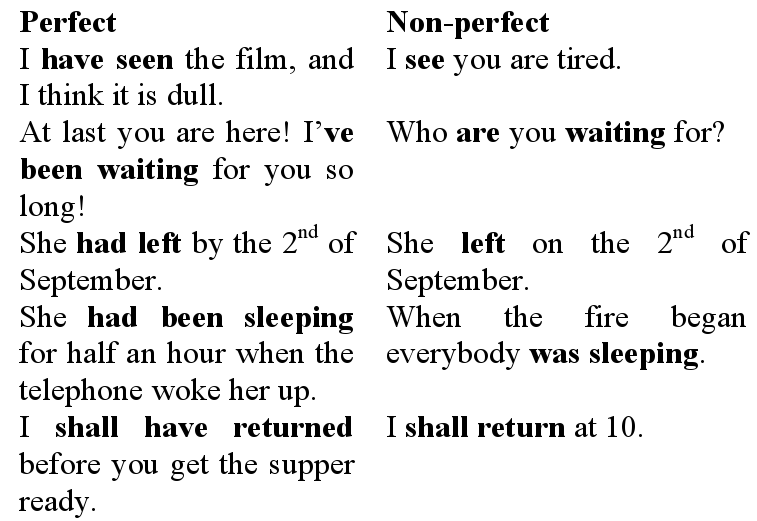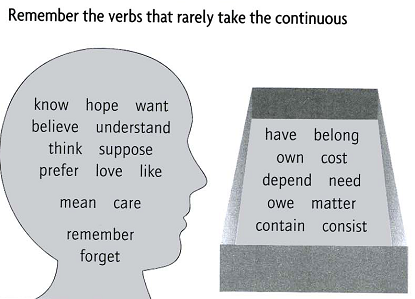
- •Unit 1. The verb. General classification
- •Part a. Theoretical Material
- •The Verb. The Morphological Composition
- •Classifications of the Verb
- •1. Verbs are words denoting actions, e.G. To play, to write, or state, e.G. To suffer, to stand. Semantically, all verbs can be divided into two groups – terminative and durative verbs.
- •Intransitive verbs do not require any object for the completion of their meaning: The sun is rising.
- •I had to reconsider my position. (modal)
- •Morphological Categories of the Verb
- •In English the category of aspect is represented by the continuous aspect and the common aspect.
- •The Category of Aspect. Statal Verbs
- •Part b. Practical Exercises
In English the category of aspect is represented by the continuous aspect and the common aspect.
Continuous |
Common |
is writing was writing will be writing has been writing |
Writes wrote will write has written |
The category of perfect is as fundamental to the English verb as the categories of tense and aspect; it is constituted by the opposition of the perfect to the non-perfect.
The perfect forms denote actions preceding certain moments of time in the past, present or future.
The non-perfect forms denote actions belonging to certain moments of time in the past, present or future.

The category of tense. There are the following tense forms in the English language
the present simple (the present indefinite),
the present continuous,
the present perfect,
the present perfect continuous,
the past simple (the past indefinite),
the past continuous,
the past perfect,
the past perfect continuous,
the future simple (the future indefinite),
the future continuous,
the future perfect,
the future perfect continuous,
the future-in-the-past simple (the future-in-the-past indefinite),
the future in-the-past continuous,
the future in-the-past perfect,
the future in-the-past perfect continuous.
The category of voice is represented by the active voice and the passive voice.
e.g. I had asked no questions, of course; but then, on the other hand, I had been asked none.
The meaning of the category of mood is the attitude of the speaker or the writer towards the content of the sentence, whether the speaker considers the action real, unreal, desirable, necessary, etc. We have the Indicative (изъявительное наклонение), the Imperative (повелительное наклонение) and the Subjunctive Mood (сослагательное наклонение) in the English language.
The Category of Aspect. Statal Verbs
Statal verbs are verbs which do not normally have continuous tenses because the describe a state rather than an action. These include:
− verbs which express likes and dislikes: like, love, hate, dislike, enjoy, prefer, etc. (Cathy likes romantic films);
− verbs of perception: believe, know, notice, remember, forget, recognize, understand, realize, seem, think, etc. (I don’t believe a word he’s saying);
− verbs of the senses: see, hear, feel, taste, look, smell, sound. We often use can or could with these verbs when we refer to what we see, hear, etc. at the moment of speaking (the soup tastes delicious. I can hear her footsteps);
− some other verbs: be, contain, fit, include, matter, need, belong, cost, owe, mean, own, appear, want, have (= possess), etc. (This book is mine. It belongs to me).

Some statal verbs can be used in the continuous, but there is a difference in meaning.
State |
Action |
I think she’s Italian (= believe). |
I’m thinking about my holiday (= am considering). |
The soup tastes awful (= has an awful flavour). |
She’s tasting the soup (= is testing its flavour). |
I can see an plane in the sky (= perceive with my own eyes). |
I’m seeing John tonight (= am meeting). |
Susan looks tired (= appears). |
Susan is looking at some photos (= is studying) |
The room smells of perfume (= has a smell). |
The cat is smelling her food (= is sniffing). |
This towel feels soft (= is). |
Jim is feeling his son’s forehead (= is touching). |
He is selfish (character – permanent state). |
He is being selfish (behaviour – temporary situation) |
Tom has a house (= possesses). |
We’re having a nice time (= we’re enjoying ourselves) |
Do you like his new car? (= Is it nice?) |
How are they liking the party? (= they are enjoying) |
Sam now weighs more than his father (= his weight is more) |
The doctor is weighing a baby (= she is finding out its weight) |
I expect you’re tired. (= imagine) |
I’m expecting an important phone call. (= waiting for) |
I have always admired Roosevelt. (= have a good opinion of somebody) |
I am just admiring your new car. (= look at with appreciation) |
My suit doesn’t fit me any more. (= it’s not the correct size) |
A man is fitting a new shower unit. (= installing) |
-
NOTICE! A few verbs which describe physical feelings
(feel, hurt, ache) can be used in either the simple or continuous form to talk about the present physical state:
Why are you lying down? – My back hurts / is hurting.
